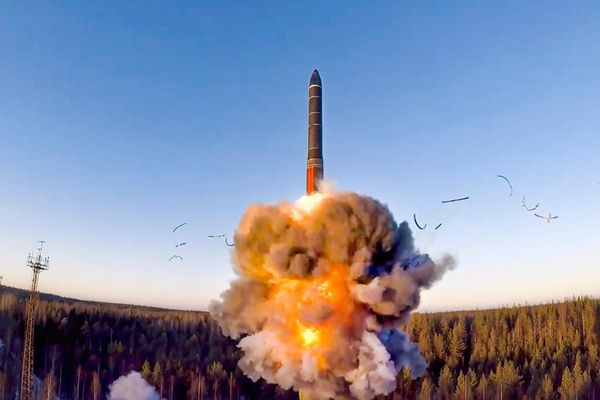For Lisa Donaldson, the annual Melanoma March is an opportunity for catharsis.
The first time she took part was seven years ago, after her father died from the disease.
"It was a very emotional event for me, I cried the entire walk," she said.
"I found that the Melanoma March was beautiful because it really brought together people who have experienced melanoma, who were challenged by melanoma and who are grieving for others who have passed.
"There is just this sense of both grief but also joy for the survivors, so it's a very special event."
Ms Donaldson had another reason to march this year, after her mother recently died from the same disease.
'There's real hope'
The march was held on Sunday in Canberra to once again raise awareness and funds for research to help those affected by the common form of cancer.
One Australian is diagnosed with melanoma every 30 minutes, and one Australian dies from the disease every 6 hours.
It is the most common cancer in those aged 20-39.
Ms Donaldson said ever since her parents were diagnosed, she had been working to remind her friends and family to take care in the sun.
Her father was a sportsman who spent a lot of time outdoors, and she said it was not a huge surprise when they learned he had several melanomas on his chest.
"I've just become so vigilant for telling my friends to get a skin check because early detection is so critically important," she said.
"It's become a bit of a passion of mine, to encourage others to slip, slop, slap and to be prepared with their sun cream and sun hats."
The second blow was when her mother found out a mole on her leg was the same cancer type that had killed her husband.
"Sometimes I feel sad that mum didn't recognise the melanoma on her leg, which was the start of all this, because she'd lived that journey caring for dad," she said.
"But by losing mum and dad it has really given me this passion to try and minimise the chance of anybody ending up with melanoma because the suffering and the treatment and everything that goes along with it is just pretty horrific."
In both cases, earlier detection might have made the difference for her parents.
Now, those involved in the Melanoma March are not just raising awareness of the importance of skin checks, but also of the work that goes into research and treatment.
The event raises funds that go towards that work, as well as towards marketing campaigns to encourage people to take care of their skin and avoid the sun.
Ms Donaldson said research had come a long way and there was hope that in the future, those who received a diagnosis might not have to face their mortality.
"There's real hope for current sufferers of melanoma, and I hope that more people can outlive this terrible cancer and live long lives."
Sun safety, early detection key
One person who did have to come to terms with a stage 4 melanoma diagnosis was Anthony Leach, who learned he had the disease in 2016.
His cancer had already spread when it was discovered, and he has had several surgeries over the years, as well as immunotherapy.
But just last week, he learned he was free of cancer thanks to the efforts of doctors.
He and his wife Margaret are now heavily involved in the Melanoma March and are raising awareness about the importance of early detection.
"My husband was very, very sun conscious. He's got fair skin and blue eyes and he's always been the one putting sunscreen on the children," she said.
"[The diagnosis] was a real shock, and it was a case of, well, why Tony?"
But she said they had also learned that melanoma "does not discriminate" and can affect people of all skin types.
Other than being sun smart, the most important thing people can do for their skin health is to get annual skin checks, to ensure whatever is found is removed early.
Ms Leach said while it was popular for young people to sunbake, she was trying to get the message out that the habit would only increase their chances of getting cancer, while also damaging their skin overall.
For Ms Donaldson, the fight to save people from melanoma is just beginning, and she has set her sights on a nationwide "audacious goal".
"I want free sunscreen dispensers put in every public toilet in Australia," she said.
"That's every playground, every park, every walking track, anywhere that there is sun.
"That is my biggest wish and I guess a bit of a legacy for mum and dad."
She said she believed her parents would be proud of her for the work she was doing.
"My dad really wanted to get out there and … tell the kids to cover up [from the sun]," she said.
"My mum was very private about it, but I know she'd be really proud of me, and if she was here today she'd be watching this news story tonight and beaming."







